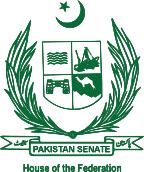
Chairman of the Senate of Pakistan
The chairman of the Senate of Pakistan (Urdu: صدر ایوانِ بالا) is the president-chair of the Senate of Pakistan.[1] According to the Constitution of Pakistan, the chairman is a presiding official and the Senate must choose a chairman and deputy chairman for a time interval of three years.[2]
Chairman of
the Senate of Pakistan
Mr. Chairman
(Informal; while presiding the house)
Honourable Chairman
(Formal)
Mr. President
(While acting as the President)
The Senate
3 years, at the Senate’s pleasure.
12 April 1973; 49 years ago
Habibullah K. Marwat
12 April 1973
During the president's absence, the chairman of the Senate is empowered with the duties of the presidency; in rare events involving the absence of the chairman, the presidential duties are usually held by the speaker of the National Assembly.[3] The chairman of the Senate is the first in the line of succession to the president of Pakistan, ahead of the speaker of the National Assembly.[4]
The first chairman of the Senate was Habibullah Marwat, while Wasim Sajjad remains the longest-serving chairman. Senator Yusuf Raza Gilani elected to Senate in the April 2 election, is the current chairman of the Senate, having assumed office on 9 April 2024.
History[edit]
After the creation of Pakistan on 14 August 1947, the first Constituent Assembly, elected in December 1945 in undivided India, was assigned the task of framing the constitution of Pakistan. This assembly passed the Objectives Resolution on 12 March 1949, laying down principles which later became substantive part of the constitution.[6] However, before it could accomplish the task of framing the constitution, it was dissolved in 1954.[6] Thereafter, the governor-general convened the Second Constituent Assembly in 1955, which framed and passed the first constitution of Pakistan on 29 February 1956.[6] That constitution was promulgated on 23 March 1956, which provided for a parliamentary form of government with a unicameral legislature.[6] However, from 14 August 1947 to 1 March 1956 the Government of India Act, 1935, was retained as the constitution of Pakistan.[6]
On 7 October 1958, martial law was promulgated and the constitution abrogated. The military government appointed a Constitution Commission in February 1960 which framed the 1962 Constitution.[6] That constitution provided for a presidential form of government with a unicameral legislature. The 1962 Constitution was abrogated on 25 March 1969.[6] The civil government, which came to power in December 1971 pursuant to 1970 elections, gave the nation an interim constitution in the year 1972.[6]
In 1973, the constitutional conventional framed the comprehensive constitution which was rectified on 12 April and promulgated on 14 August 1973.[6] Retired Senior Justice Habibullah Khan Marwat was elected its first chairman and remained until 1977.[6] The 1973 Constitution also provided a parliamentary system of government with a bicameral legislature: the National Assembly (lower house) and the Senate (upper house). The membership of the Senate, which was originally 45, was raised to 63 in 1977 and to 87 in 1985.[6] In 2002, the membership rose to 100 through the legal framework enforced on 21 August 2002. Now there are 104 members.[6]
Relationship between constituents of the Parliament[edit]
The Parliament of Pakistan consists of the president and the two legislative houses: National Assembly (lower house) and the Senate (upper house).[7]
The president is elected by members of both Houses of the Parliament and the four provincial assemblies.[8] The president may be removed from office or impeached through a resolution, passed by not less than two-thirds of the total membership of the Parliament in a joint sitting of the two Houses, convened for the purpose.[9] In case the office of the president becomes vacant for any reason, the chairman, or if he is unable to perform the functions of the office of the president, the speaker, acts as president till such time that a president is elected.[1] Same is the case when the president by reason of absence from Pakistan or any other cause is unable to perform his functions.[1]